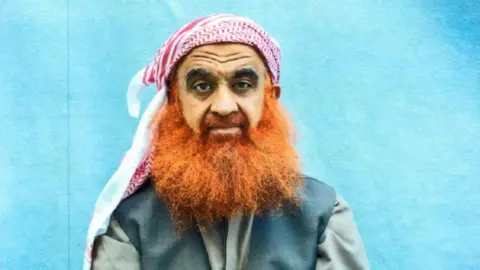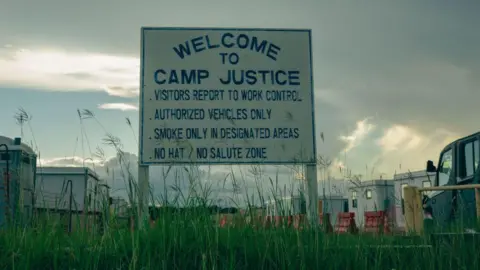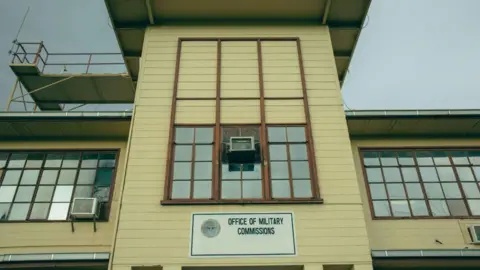ARTICLE AD BOX

 Photo courtesy of Khalid Sheikh Mohammed’s legal team
Photo courtesy of Khalid Sheikh Mohammed’s legal team
A recent photo of Khalid Sheikh Mohammed
Sitting on the front row of a war court on the US's Guantanamo Bay naval base in Cuba, Khalid Sheikh Mohammed, one of the world's most notorious defendants, appeared to listen intently.
"Can you confirm that Mr Mohammed is pleading guilty to all charges and specifications without exceptions or substitutions?" the judge asked his lawyer as Mohammed watched on.
"Yes, we can, Your Honour," the lawyer responded.
Sitting in court, 59-year-old Mohammed, his beard dyed bright orange and wearing a headdress, tunic and trousers, bore little resemblance to a photo circulated shortly after his capture in 2003.
Mohammed, the accused mastermind of the 9/11 terror attacks on the US, had been due to plead guilty this week - more than 23 years after almost 3,000 people were killed in what the US government has described as "the most egregious criminal act on American soil in modern history".
But two days later, just as Mohammed had been set to formally enter his decision - the product of a controversial deal he struck with US government prosecutors - he instead watched silently as the judge said the proceedings had been paused under the orders of a federal appeals court.
It was expected to be a landmark week for a case that has faced a decade of delays. Now, with a new complication, it continues into an uncertain future.
"It's going to be the forever trial," the relative of one of the 9/11 victims said.
A plea on hold
Mohammed has previously said that he planned the "9/11 operation from A-to-Z" - conceiving the idea of training pilots to fly commercial planes into buildings and taking those plans to Osama bin Laden, leader of the militant Islamist group al-Qaeda.
But he has not yet been able to formally admit guilt to the court. This week's pause comes amid a dispute over a deal reached last year between US prosecutors and his legal team, under which Mohammed would not face a death penalty trial in exchange for his guilty plea.
The US government has for months tried to rescind the agreement, saying that allowing the deal to go ahead would cause "irreparable" harm to both it and the American public. Those in support of the deal see it as the only way forward in a case that has been complicated by the torture that Mohammed and others faced in US custody and questions over whether this taints the evidence.
After a last-minute appeal by prosecutors, a three-judge panel at the federal appeals court called for the delay to give them time to consider the arguments before they would make a decision.
But families of victims had already flown on a once-weekly flight to the base to watch the pleas in a viewing gallery, where thick glass separated them and members of the press from the rest of the sprawling high-security courtroom.

 Getty Images
Getty Images
The attendees had won their place at this week's proceedings through a lottery system. They arranged child care and paid for kennels for their pets to attend - knowing that they could be called off at any minute. They learnt Thursday night while speaking to the media at a hotel on the base that the pleas would no longer go ahead.
Elizabeth Miller, whose father, New York City firefighter Douglas Miller, died in the attacks when she was six years old, said she was in favour of the deal going forward to "bring finality", but recognised that there were other families who felt it was too lenient.
"What's so frustrating is that every time this goes back and forth, each camp gets their hopes up and then gets their hopes crushed again," she said, as other relatives nodded in agreement.
"It's like a perpetual limbo… It's like constant whiplash."
Guantanamo Bay's final cases
This week's pause is just the latest in a series of delays, complications and controversies on the base, where the US military has now been holding detainees for 23 years.
The military prison on Guantanamo Bay was established during the "war on terror" that followed the 9/11 attacks that Mohammed is accused of orchestrating. The first detainees were brought there on 11 January 2002.
Then-President George Bush had issued a military order establishing military tribunals to try non-US citizens, saying they could be held without charge indefinitely and could not legally challenge their detention.
Dressed in bright orange jumpsuits, the 20 men were brought to a temporary detention camp called X-Ray, where the cells were exposed cages and the beds mats on the floor.
The camp, surrounded by barbed wire, is now long abandoned and overgrown - weeds are growing on wooden watchtowers and signs along the fence say "off limits" in red text.
While conditions have improved at Guantanamo, it continues to face criticism from the United Nations and rights groups over its treatment of detainees. And it continues to challenge US officials and advocates who hope to see it closed.
As president, Barack Obama pledged to close the prison during his terms, saying it was contrary to US values. These efforts were revived under the Biden administration.

 Getty Images
Getty Images
The cases of the remaining prisoners are overseen by military commissions, which operate under different rules than the traditional US criminal justice system
Unlike Mohammed, most people held there since its creation were never charged with any crimes.
The current detention facilities are off limits to journalists, with access only granted to those with security clearance.
A short drive away, there is an Irish pub, a McDonald's, a bowling alley and a museum, serving military personnel and contractors on the base - the majority of whom have never been inside the prison zone.
As legal teams, journalists and families gathered on the base for Mohammed's scheduled pleas, a secret early morning operation was conducted to fly a group of 11 Yemeni detainees off of the base for resettlement in Oman.
With that transfer, the base, which once held almost 800 detainees, now holds just 15 - the lowest number in its history.
Of those remaining, all but six have been charged or convicted of war crimes, with lawyers arguing their cases in complex legal battles at the base's high-security courtrooms.
As the court was dismissed on Friday, the judge said that Mohammed's pleas, if allowed to go ahead, would now fall into the next US administration.

 4 months ago
24
4 months ago
24








 English (US) ·
English (US) ·